

Réalité virtuelle et réalité augmentée : quel apport dans la formation. Mieux comprendre l’Adaptive Learning, introduction des notions de Macro et Micro Adaptive Learning. Mieux comprendre l’Adaptive Learning, introduction des notions de Macro et Micro Adaptive Learning 4.6 (91.06%) 47 votes L’Adaptive Learning est l’une des grandes tendances en formation professionnelle.
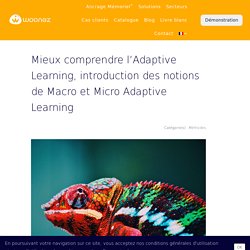
Et pour cause, il s’agit de proposer des formations capables de s’adapter aux apprenants. Le rêve ! Toutefois, en Adaptive Learning comme ailleurs, on trouve de tout. La revanche des neurones. Abstract : Since 2010, machine learning based predictive techniques, and more specifically deep learning neural networks, have achieved spectacular performances in the fields of image recognition or automatic translation, under the umbrella term of “Artificial Intelligence”.
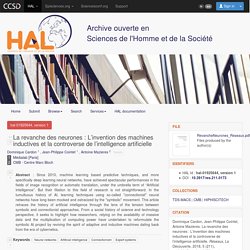
But their filiation to this field of research is not straightforward. In the tumultuous history of AI, learning techniques using so-called "connectionist" neural networks have long been mocked and ostracized by the "symbolic" movement. This article retraces the history of artificial intelligence through the lens of the tension between symbolic and connectionist approaches. From a social history of science and technology perspective, it seeks to highlight how researchers, relying on the availability of massive data and the multiplication of computing power have undertaken to reformulate the symbolic AI project by reviving the spirit of adaptive and inductive machines dating back from the era of cybernetics.
Adaptive Personalization of Pedagogical Sequences using Machine Learning. Abstract : Can computers teach people?
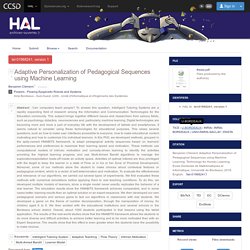
To answer this question, Intelligent Tutoring Systems are a rapidly expanding field of research among the Information and Communication Technologies for the Education community. This subject brings together different issues and researchers from various fields, such as psychology, didactics, neurosciences and, particularly, machine learning. Digital technologies are becoming more and more a part of everyday life with the development of tablets and smartphones. It seems natural to consider using these technologies for educational purposes. This raises several questions, such as how to make user interfaces accessible to everyone, how to make educational content motivating and how to customize it to individual learners. Résumé : Les ordinateurs peuvent-ils enseigner ? Système de recommandation de ressources pédagogiques fondé sur les liens sociaux : formalisation et évaluation.
Abstract : With the increasing amount of educational content produced daily by users, it becomes very difficult for learners to find the resources that are best suited to their needs.
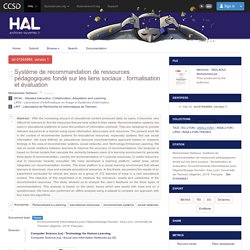
Recommendation systems are used in educational platforms to solve the problem of information overload. They are designed to provide relevant resources to a learner using some information about users and resources. The present work fits in the context of recommender systems for educational resources, especially systems that use social information. We have defined an educational resource recommendation approach based on research findings in the area of recommender systems, social networks, and Technology-Enhanced Learning. We rely on social relations between learners to improve the accuracy of recommendations. Personnalisation des MOOC par la réutilisation de Ressources Éducatives Libres. Abstract : For many years now, personalization in TEL is a major subject of intensive research.
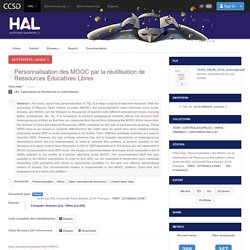
With the spreading of Massive Open Online Courses (MOOC), the personalization issue becomes more acute. Actually, any MOOC can be followed by thousands of learners with different educational levels, learning styles, preferences, etc. So, it is necessary to present pedagogical contents taking into account their heterogeneous profiles so that they can maximize their benefit from following the MOOC.At the same time, the amount of Open Educational Resources (OER) available on the web is permanently growing. These OERs have to be reused in contexts different from the initial ones for which they were created.Indeed, producing quality OER is costly and requires a lot of time.
Then, different metadata schemas are used to describe OER. Vers un modèle de recommandation se basant sur les préférences personnelles d'un apprenant et sur les liens sociaux dans un cadre collectif. L’impact de l’IA sur l’éducation. L’Intelligence Artificielle est de tous les sujets, l’éducation n’y échappe donc évidemment pas. Cela a donné lieu à des essais très manichéens comme la « guerre des intelligences », mais aussi à des rapports prospectifs plus scientifiques.
Citons Intelligence Unleashed proposé par le Knowledge Lab de l’UCL (Londres) en 2017 qui nous rappelle que l’IA en éducation a déjà une longue histoire et qui propose de nombreuses pistes pour résoudre un certain nombre de problèmes en éducation. Citons également le rapport récent d’orientation pour la commission européenne « The Impact of AI on Learning, Teaching, and Education » par Ilkka Tuomi qui reprend des éléments du premier avec une vision plus globale.